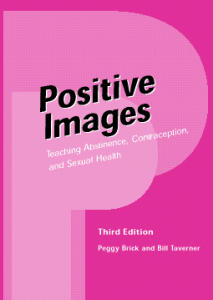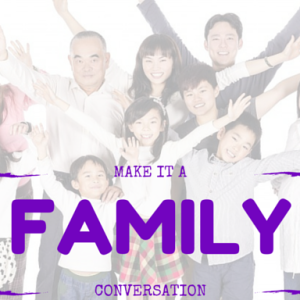by The CFLE
The Institute of Medicine just released suggestions on women’s preventive health care, and included a recommendation that all birth control costs be completely covered under insurance, with no co-pay required. It’s a long-overdue step in the right direction for women’s health!
In celebration, The Center for Family Life Education is sharing a sex ed lesson on how to talk to parents about contraception, entitled “Making the Parent Connection: Encouraging Communication Within the Family”. It’s one lesson in the Positive Images manual, which can be ordered here.
What’s your favorite way to teach your students to talk to their parents about important life choices?
OBJECTIVES:
Participants will:
- Consider why most parents do not talk with their children about sexuality and contraception.
- Take part in role-play of an adolescent-parent interaction and identify behaviors that encourage and discourage communication.
- Discuss whether communication between parents and their children would help develop responsible sexuality and discourage unwanted pregnancy and infection.
RATIONALE:
Research consistently indicates that most parents do not talk openly with their children about sexuality. Communication seems to be especially difficult during the adolescent years when teens are establishing independence from their families – sometimes through sexual activity. At the same time, many young people contend that they do not obtain and use contraception because they fear if they do so their parents will discover they are having intercourse. This lesson helps participants examine family communication about sexuality and explore ways to initiate discussion on sexual issues.
PROCEDURE:
1. Start discussion by noting that research indicates that fewer than 20% of parents talk about sexual matters with their children. Ask students why it is difficult for many parents to talk with their children about sexuality.
2. Ask participants to brainstorm the reasons why it would be advantageous for parents to talk about sexuality, including contraception and safer sex, with their children. (Write the reasons on the board as participants suggest them.)
3. Explain that the group is going to do a new kind of role-play to explore family communication about sexuality. Divide the group into four groups and give each group a card describing one member of the family. (From Worksheet: ROLE-PLAY CHARACTERS.) Each group reads the description and discusses how its character will act in a role-play of the current crisis in the household. After about five minutes, ask the group to select one volunteer to take part in the role-play.
4. Distribute small index cards to all other group members. During the skit, group members may write a suggestion on the card and deliver it to the actor from their group. (Actors may choose to use the suggestion or ignore it.)
5. Actors come front. Help each get into the role by asking: “How are you feeling about the situation in your family right now?” Now let the players begin the scene.
6. Let the scene continue as long as it seems productive. After about 10 minutes, let the actors return to their own group to get more suggestions. A new person may assume the role at this time if the group so chooses.
7. Let actors return to the “stage” and continue the role-play. (Group members continue to make written suggestions to their actor.)
8. Stop the role-play in time to debrief the actors and help them get out of their roles. Ask each, “How did you feel in the role that you played?”
Discussion Questions:
a. What examples can you give of something a family member did or said that encouraged communication? Examples of something that discouraged communication?
b. Should this family have started talking about sexuality sooner? Explain.
c. Ask the actors who played the Mother and Father why they might have been reluctant to raise the topic.
d. What would you recommend to individual family members concerning future communication about sexual issues?
Note: This lesson suggests one possible situation for a role-play examining family conversation about sexuality and contraception. However, we recommend that you adapt it to fit situations familiar to your own group. Perhaps you want to change the age of the daughter or her boyfriend. Perhaps you want to try a single-parent family, or stepparent family, or an extended family. Because the purpose of the role-play is for participants to examine family communication patterns and the effects these may have on sexual behavior, participants must be able to identify to some degree with the characters portrayed. Be alert to the fact that different ethnic groups have different attitudes about such discussions.
Worksheet: ROLE PLAY CHARACTERS
MAKING THE PARENT CONNECTION
Mother, 44 (related to: Son, 20; Daughter, 17)
Your daughter, who is only 17, has been going out with a man, 22 years old, who is a good friend of your son. You’re worried that they are having intercourse, though you hope not. You believe that older men often pressure girls to have intercourse before they are really ready. You know that you should talk to your daughter about the possibility of a pregnancy and the importance of using contraception. However, you really want to encourage her to say “no.” Last night you discussed the matter with your husband, and you agreed to bring the subject up at dinner tonight.
Father, 46 (related to: Son, 20; Daughter, 17)
Your daughter, who is only 17, has been going out with a man, 22 years old, who is a good friend of your son. You’re worried that they are having intercourse, though you hope not. You believe that older men often pressure girls to have intercourse before they are really ready. You know you should talk to your daughter about the possibility of a pregnancy and the importance of using contraception. However, you really want to encourage her to say “no.” Last night you discussed the matter with your wife, and you agreed to bring the subject up at dinner tonight.
Daughter, 17, High School Junior
For three months now, you’ve been going out with a man, 22 years old, who is a good friend of your brother. You like him a lot, and you’ve been spending more and more time alone together. You think he wants to have intercourse, but you’re nervous about it. You would be happy to keep the relationship just the way it is now, but you don’t think he will be. Last night you overheard your parents talking, and you know they plan to talk with you about your relationship at dinner tonight.
Son, 20 Years Old
For about three months, your sister, a high school junior, has been dating your friend who is 22 years old. Their relationship seems to be getting serious, and while you haven’t talked to your friend about it, you suspect he wants them to have intercourse. It’s hard for you to imagine your little sister having intercourse, but your friend is a great guy, and you think it’s a good relationship. You heard your parents talking about discussing this relationship at dinner tonight.
To be used with Positive Images, 3rd Edition. Brick and Taverner, Planned Parenthood of Greater Northern New Jersey, 2001.







